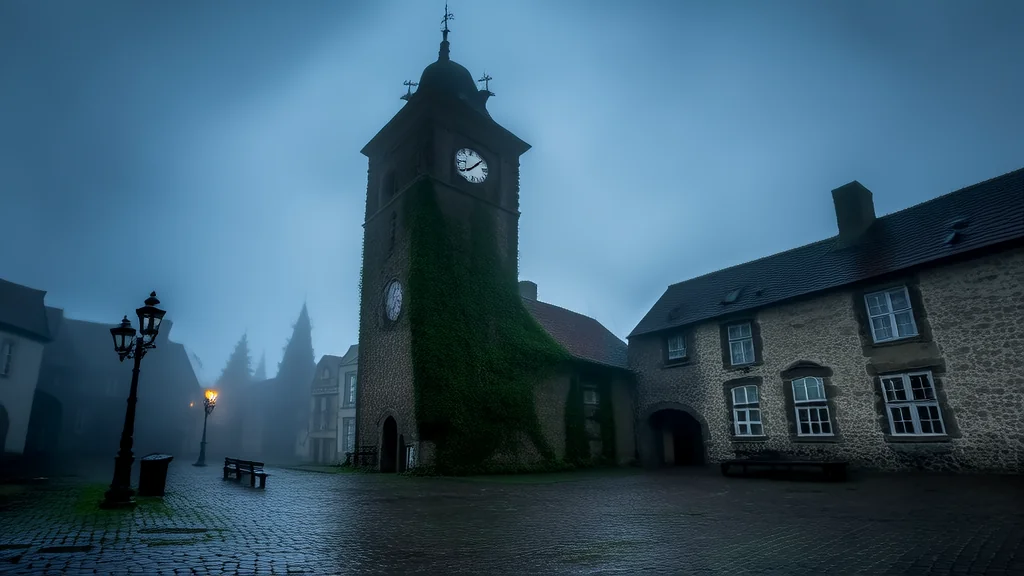🔮 Weird Tales & Urban Legends
The Whispering Clock Tower and the Man Who Collected Time

The old clock tower at the edge of the village had always been a quiet place, its chimes echoing through the narrow streets like whispers from another time. No one really knew when it was built, only that it had stood for centuries, its gears and mechanisms untouched by modern hands. The villagers avoided it, not out of fear, but because of the strange way the air seemed to shimmer around it, as if the very fabric of reality was slightly frayed.
Elias, a quiet man with a habit of collecting oddities, found himself drawn to the tower one rainy afternoon. He had heard stories about the clock’s peculiar behavior—how it would sometimes tick backward, or how the hands would stop mid-swing, leaving the townsfolk in confusion. But Elias wasn’t here for superstition. He was a historian, and the tower had recently come into his possession after an elderly relative passed away without heirs.
Inside, the air was thick with dust and the scent of old wood. The main chamber was dimly lit by a single flickering bulb, casting long shadows across the stone walls. At the center stood the massive clock, its face cracked and weathered, yet still somehow intact. As Elias approached, he noticed something unusual—the second hand was moving, but not forward. It was going backward, slowly, almost imperceptibly, as if time itself was being unraveled.
He reached out to touch the glass, and the moment his fingers brushed the surface, the world shifted. The room filled with a low hum, and the temperature dropped. When the sound faded, Elias found himself standing in the same spot, but the clock’s hands were now spinning wildly in both directions. He staggered back, heart pounding, but the sensation was gone as quickly as it came.
Over the next few days, Elias began to notice more strange occurrences. He would wake up in his bed, only to find the calendar had advanced three days. A cup of tea would cool down instead of warming up. Once, he saw a child playing outside his window, but when he opened the door, the street was empty. He started keeping a journal, documenting each anomaly with careful precision.
One evening, while examining the clock again, he noticed a small, hidden compartment behind the face. Inside was a set of old keys and a letter written in a trembling hand. The letter spoke of a man who had once lived in the tower, a watchmaker named Alaric. He had discovered a way to manipulate time, using the clock as a conduit. But the power was too great, and he had vanished, leaving behind only the machine and his final warning: *“Time is not meant to be held. To hold it is to lose yourself.”*
Elias felt a chill run through him. He tried to leave the tower that night, but the door wouldn’t open. The key he had found didn’t fit. He wandered the halls, searching for an exit, but every corridor led back to the same room. The clock’s hands spun faster, the hum grew louder, and the air became heavier, as if the space itself was resisting his presence.
In a panic, he climbed the spiral staircase to the top of the tower. From there, he could see the village below, but something was wrong. The buildings were the same, yet their shapes seemed off, as if they were frozen in a different moment. A woman walked down the street, her face familiar, but when she turned, her eyes were hollow and dark. Elias gasped and stumbled back, knocking over a small table. A book fell to the floor, its pages fluttering open to reveal a sketch of the tower—and a man standing beside it, wearing the same coat he was now wearing.
He ran down the stairs, but the tower was no longer the same. The walls had grown taller, the ceiling closer. The clock was gone, replaced by a mirror that reflected not his image, but a version of himself standing in the middle of the village, watching the tower with a knowing smile. He reached out, but the mirror showed only silence.
When Elias finally escaped, he found himself in his own home, the morning after he first entered the tower. The clock on the wall ticked normally, and the village was quiet. But he couldn’t shake the feeling that something had changed. He kept the journal, the keys, and the letter, but he never returned to the tower.
Years later, people in the village would whisper about the strange man who sometimes appeared at the edge of town, dressed in an old coat, watching the clock tower with a look of quiet understanding. No one ever saw him again, but some claimed to hear the faint ticking of a clock that hadn’t been heard in decades.
发布于 en
🔗
相关站点
- AI Blog — AI 趋势与技术新闻